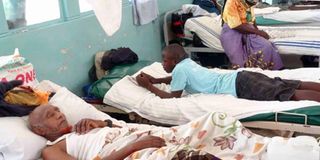Hassan Joho pleads with doctors to save lives

Patients in a Coast General Hospital ward. Patients continued being turned away at Coast General Hospital on Thursday as striking doctors resisted pressure to resume work. PHOTO | LABAN WALLOGA |
What you need to know:
- The complaints ranged from unpaid July salaries to acute shortage of medicine, equipment and staff.
- Mr Joho pleaded with them to resume work.
The poor state of the Coast region’s biggest referral hospital was exposed by health workers and administrators on Tuesday during a meeting with Mombasa Governor Hassan Joho.
Mr Joho, who was out of the country when doctors at the Coast General Hospital went on strike three days ago, visited the health centre on Tuesday, creating an opportunity for the workers to open up on why things had gone out of hand.
The complaints ranged from unpaid July salaries to acute shortage of medicine, equipment and staff.
The governor was informed that out of the 10 theatres at the facility, only two were in a working condition. Surgeons work in shifts twice a week, because of a shortage of nurses.
This state of affairs, said Dr Peter Aseyo, had made surgeons “unhappy” because they are unable to perform their duties.
“I operate once in a week. There are 10 theatres and only two are working. We want to work but we are unable because of lack of nurses and other basic equipment,” said Dr Aseyo, cardiothoracic surgeon.
“I did not come to Mombasa from Western to stare at buildings,” an angry Dr Aseyo added, during the candid forum at the hospital’s boardroom.
RATIO OF NURSES
At the referral hospital, said Dr Aseyo on behalf of his colleagues, the ratio of nurses was demoralising because one nurse served between 40 and 60 patients. The World Health Organisation’s recommendation is one nurse to four patients.
“Health workers are not politicians. We do not know how to put the points across clearly so that Kenyans can get the real scenario of what is happening,” said the surgeon.
But Dr Aseyo and the nurses’ union branch union representative, Mr Stanley Mwailogho, told Mr Joho that the biggest problem was lack of communication and poor advice to the governor by officials they did not name.
They singled out deployment of unsupervised interns which they said was risking the lives of patients. “Interns cannot do any work without supervision. You cannot entrust the life of a patient to an intern,” the surgeon said.
He said health workers felt terrible when they went to work only to find a notice informing them that they could not work because of shortage of staff.
“Sometimes I go to the wards at night to see patients and find one nurse with 40 to 60 patients. When the nurse sees you she feels very bad thinking you are going to give her more problems. As you walk around, you will see a patient has died, but the nurse is unaware as she is giving blood to another patient,” he said and urged the governor to sort out the hospital’s woes.
“In the office you will be told all is well, but we are the people on the ground. The hospital has ground to a halt, things are bad, don’t be cheated Mr Governor. We used to have over 600 patients now there are less than 200 patients. Reasons are shortage of staff. It is a fact there is a big shortage,’’ said Mr Mwailogho.
He said health workers at the hospital were also demoralised due to the delay of salaries.
“When they knew the salaries would be delayed, they communicated very late,” he said.
The hospital’s administrator, Dr Bernard Mwero, supported Mr Mwailogho’s sentiments and acknowledged that the hospital had a skeleton staff.
ADDRESS GRIEVANCES
Even the diet is not suitable for patients, he added.
Mr Joho pleaded with them to resume work with an assurance that they would be paid their by Friday and that their other grievances were being addressed.
He said for the 700-bed capacity facility to run efficiently, it should be allocated at least Sh3 billion, adding that his government was seriously disadvantaged in the formula used for revenue allocation.
“Let us look at this issue holistically. Help us doctors, please save lives. I will address your grievances,” he pleaded.
The hospital has revenues of Sh700 million which can be used to pay workers, but this cannot be done without the Treasury’s approval.





